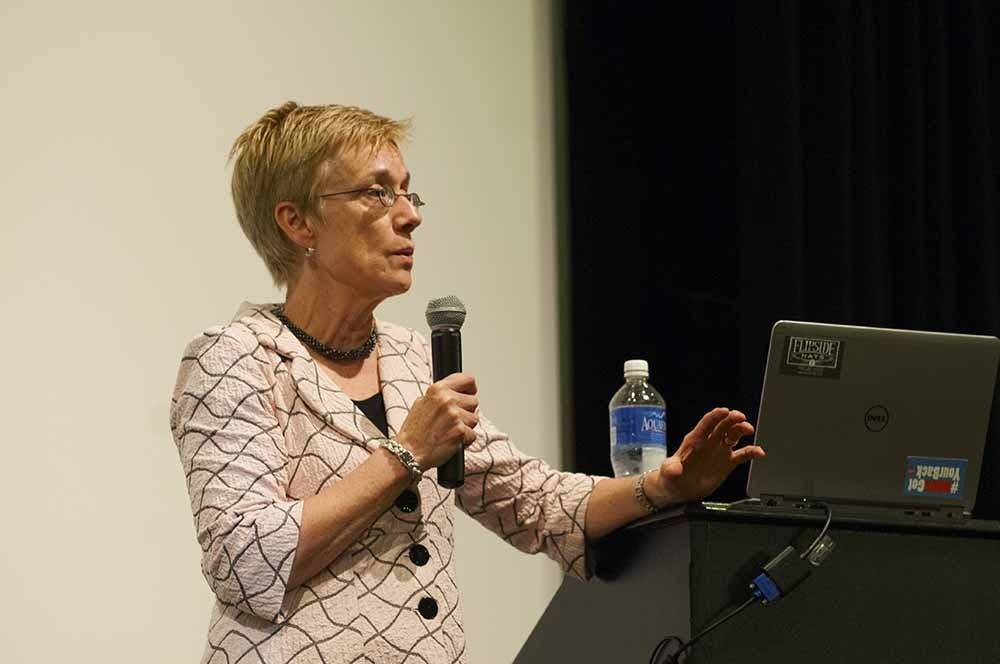Take Back the Night held a panel style discussion about Title IX legal requirements and the University's new sexual misconduct policy Tuesday as a part of their week long event combatting sexual misconduct. The panel, titled “A Discussion on Sexual Misconduct Policy and the Law,” was headed by 2014 College graduate Emily Renda, project coordinator in the Office of the Vice President for Student Affairs, Assoc. Dean of Students Nicole Eramo and Law Prof. Anne Coughlin.
Each panelist prepared a presentation covering topics ranging from the history and background of Title IX and prior policies, community input on the revised interim Policy on Sexual and Gender-Based Harassment and Other Forms of Interpersonal Violence released March 30 and recent legislative changes regarding sexual misconduct policy.
Fourth-year College student Erica Robertson, major event chair for the Sexual Violence Prevention Coalition, said the event was the first time students had the opportunity to openly discuss the new policy.
“It will finally provide people with an understanding of the behind the scenes workings of how the University handles sexual assaults,” Robertson said. “By having this kind of event it helps to break it down to help everyone understand it better.”
At the panel, Renda provided a broad legal context for the new policy and explained the difference between University and criminal actions in cases of sexual assault.
Renda said many people questioned why the police did not directly handle cases of sexual assault on campus.
“School based adjudication is very different from criminal [adjudication],” Renda said. “Under Title IX, [the new policy] covers a spectrum of conduct that is far broader than what might be criminalized in any state.”
Renda emphasized that the University system of investigation and the criminal justice system are not mutually exclusive.
“A lot of people think we are asking people to choose between the University system and the criminal system,” Renda said. “In an ideal world someone would use both, since both are available to them… [and] these two systems have fundamentally different tools at their discretion.”
Eramo explained some of the nuances of the revised policy and said it is not just a procedural document like the previous policy used by the University.
“After some consideration and looking at examples of other schools and what they have done, we broke the policy into this umbrella policy document,” Eramo said.
The new policy outlines resources for survivors, practices to encourage reporting, detailed separate procedures for students, faculty and employees and various expanded definitions.
“[The Violence Against Women Act] requirements require us to enhance some of the definitions we had before,” Eramo said. “In the new policy we talk about affirmative consent rather than effect consent.”
The panel also explained the single investigator model, which Eramo said has already been adopted by schools such as University of Michigan, Tufts University and Dartmouth College.
The single investigator model outlined in the revised policy provides one lawyer trained in relevant areas of the law who will investigate both sides of a complaint, draw up a report and present the report to both the complainant and the respondent as well as a review panel.
Coughlin said the single investigator model is an attempt to avoid the retraumatization of survivors.
“We were trying to balance legal imperatives from a lot of different statues and be mindful of our community as well,” Coughlin said. “The idea was to try to reproduce what cross examination is supposed to produce but without people having to go through the process of being cross examined and confronting each other.”
Coughlin also addressed the issue of a single sanction policy in the wake of the Rolling Stone article.
“At the time that the story first broke there was a lot of commentary coming our way that expulsion had to be on the table,” Coughlin said. “As time went by, we realized there are a range of different types of sexual misconduct covered by our policy.”
Coughlin said she wanted to clarify while expulsion and suspension will be considered, there is no single sanction system regarding sexual misconduct.
“[There] isn’t one form of single misconduct,” Coughlin said. “It’s a broad spectrum of sexual misconduct that we’re discussing.”
Renda said she does not want survivors to be discouraged from reporting incidents of sexual assault from fear of being forced into such a strict system of punishment.
“As a survivor myself and from working with many survivors, there’s a strong presumption from the community that everyone must want the same outcome,” Renda said. “Single sanction is not best process for engaging in higher reporting rates.”







